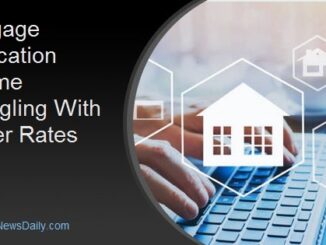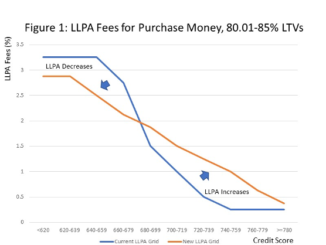
A new policy for mortgage borrowers from U.S.-government-backed institutions has inspired mostly right-wing criticism suggesting the changes benefit individuals with lower credit scores at the expense of borrowers with higher credit scores, but proponents suggest that’s an incomplete characterization of the situation.
Beginning Monday, the Federal Housing Finance Agency altered the loan fees charged to Americans with mortgages from Fannie Mae and Freddie Mac, which provide more than half of all mortgages in the U.S.
According to the Urban Institute, out of 81 types of borrowers classified by down payments and credit scores, the FHFA increased the fees of 23 groups—mainly those with excellent credit scores—by as much as 75 basis points and slashed the fees of 45 groups—largely borrowers with fair scores and lower down payments—by as much as 200 basis points.
Criticism of the plan has escalated in recent days: On Monday, 34 high-ranking financial officials across 27 states sent a letter to Biden claiming the “unconscionable policy” would “further depress” the real estate market and “unfairly cost” middle-class Americans “millions upon millions of dollars.”
But some experts disagree: Jim Parrott and Janneke Ratcliffe of the Urban Institute think tank’s Housing Finance Policy Center point out a separate policy forces borrowers with a down payment of less than 20% to buy mortgage insurance—allowing the FHFA to charge them less because their loans are less risky and making it so less-qualified buyers are still ultimately paying higher fees.
The FHFA is “not raising fees on borrowers with good credit to lower them for those with bad credit,” Parrott explains, arguing the agency is instead “raising fees on loans there is little reason to discount so that it can better serve those who need the help.”
FHFA head Sandra Thompson has also addressed the “misunderstanding,” saying much of the hostility focuses on separate recently announced policies, which ended upfront mortgage fees for low- and middle-income first-time home buyers and upped fees for mortgage seekers for second homes.
CHIEF CRITIC
Railing against “President Biden’s mortgage socialism rule,” Rep. Barry Loudermilk (R-Ga.) tweeted Tuesday that borrowers with a credit score of 680 and above with mortgages from Fannie Mae and Freddie Mac will “see a spike in your borrowing costs” to fund the mortgages of individuals with worse credit. It’s unclear what Loudermilk, who sits on the House’s financial services committee, is referring to, as less than half of the down-payment-based groupings of borrowers with credit scores 680 and above saw fee hikes beginning Monday.
BIG NUMBER
About $3,200. That’s how much more a borrower in the most-affected qualifying group buying a new home at the average U.S. sale price of $516,500 will pay under the new FHFA rules. These borrowers with credit scores between 720 and 759 taking out a mortgage for between 80% and 85% of the home’s value will pay a 75-basis-point higher fee. Despite the changes, however, the fees remain far greater for individuals with lower credit scores. Borrowers with credit scores over 780 now pay a 0.4% fee for loans worth 75% to 80% of the home price, while borrowers with credit scores below 640 pay a 2.8% fee on the same mortgage.
CONTRA
“It’s not the case that every category of person with good credit will pay more. There’s not that sort of direct relationship here and it does not affect any particular category of borrower across the board,” George Washington University professor Vanessa Perry told Bloomberg last week.
KEY BACKGROUND
The FHFA policy updates come at a particularly tenuous time for the housing market. Hovering near a two-decade high, 30-year mortgage rates were 6.4% as of last week, more than twice as high as they were at the beginning of last year—before the Federal Reserve started hiking interest rates in its attempt to slow inflation.
Source: www.forbes.com
ENB
Sandstone Group



